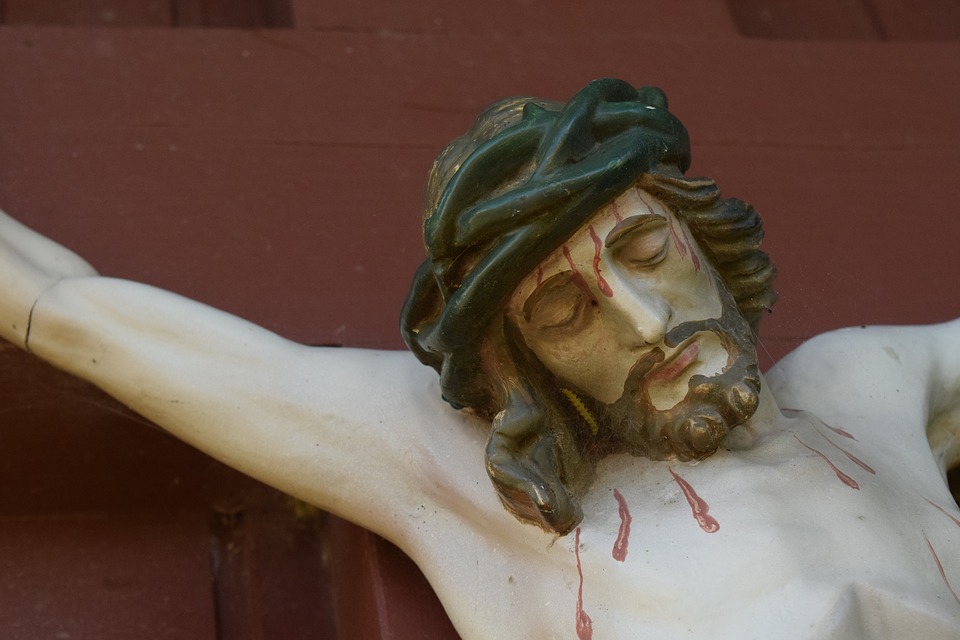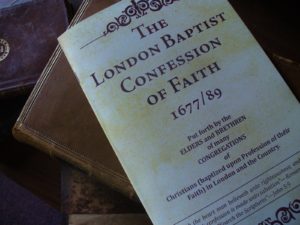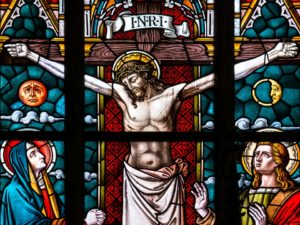The Double Payment Argument is that if God died for all people, yet sends some people to Hell, then that means that their sins were paid for twice, once in hell, and once by Christ on the cross. This, the Calvinist argues, entails that God has acted unjustly because God has punished sin more than the sin deserved. He punished it once and punished it twice. This argument is also sometimes referred to as “The Double Jeopardy Argument”. The person who popularized this anti-Arminian argument was John Owen (even though, according to some sources, he wasn’t the first).
How do we who believe Christ did die for all people deal with this argument?
I Could Say “I Stand Alone On The Word Of God. So, Ha ha!”
One tactic would be to act like a Calvinist and use their own evasion tactics against them. We can say “We don’t need philosophy to guide our exegesis. I’m a Bible guy. The Bible says Jesus died for all people, so therefore, I believe it.” After all, The Double Payment Argument is of a purely philosophical nature. It’s nowhere to be found in The Bible. Why should we let Calvinists put a ban on philosophical theology only when it suits them? If you want to stick to avoiding philosophical arguments entirely and stick solely to exegesis, then do that.
The Bible does indeed teach that Jesus died for all of humanity.
“For God so loved the world that He gave His one and only son that whosoever believes in him will not perish but have eternal life. For God did not send His son into the world to condemn the world but that the world might be saved through Him.” – John 3:16-17
“This is good and pleases God our Savior who wants all people to be saved and come to a knowledge of the truth. For there is one God and one mediator between God and mankind, the man Christ Jesus, who gave himself as a ransom for all people.“ – 1 Timothy 2:4-6
“[Jesus] is the atoning sacrifice for our sins, and not only for ours but also for the sins of the whole world.” – 1 John 2:2
“Jesus tasted death for everyone.” – Hebrews 2:9
“And we have seen and testify that The Father has sent His Son to be the Savior of the world.” – 1 John 4:14
“And he died for all, that those who live should no longer live for themselves but for him who died for them and was raised again.” – 2 Corinthians 5:15
“I am the living bread that came down from heaven. Whoever eats this bread will live forever. This bread is my flesh, which I will give for the life of the world.” – John 6:51.
These are but a small sampling of Bible passages stating the universal extent of God’s love, salvific will, and of the atonement. So, the fact that The Bible says that Jesus died for all is enough for me to believe it. I could just respond to The Double Payment Argument, “I don’t know how to answer this. It’s a mystery”. I could respond “The Bible trumps your human philosophy.”. They probably wouldn’t like that though. They don’t mind appealing to mystery all the time, but they don’t want you doing so when they think that they’ve found a problem with your theology.
Oh, and if something is “right” just because God does it (as many Calvinists claim in an effort to explain how God is just to judge the sin He causes people to commit), then why can’t we conclude that God punishing sin twice is “just” and “right” simply because He does it? After all, His justice is simply different than ours, right? And, “who are you Oh man to talk back to God?” anyway? Mr. Calvinist, you can’t have it both ways.
But I Won’t Respond That Way
I could just simply write it off as a mystery and forget about it, but I won’t. I will actually deal with it in this blog post. Does unlimited atonement lead to the conclusion that God deals unjustly? Is there double jeopardy in dying for someone who goes to Hell?
I want to share a few thoughts with you.
1: Molinism To The Rescue!
In a Q&A blog post about unlimited atonement, William Lane Craig brought up an interesting proposal regarding Christ’s death and whom it was intended for. He suggested that it’s possible that Jesus did die only for the elect, but that’s only because the elect would become elect by repenting, receiving God’s Spirit, having the blood applied to them. But Jesus would have died for a non-elect person if that person would have repented. If someone would have come to Christ had He died for them, then Jesus would have actually died for them. God would know this in His middle knowledge.
On this proposal, you could hold to Limited Atonement, but still, believe salvation is available to all. Jesus died for all whom He knew would freely choose to respond to His grace. He doesn’t bar anyone access to salvation despite only dying for some. It would be like if I planned a party and foreknew who would and would not eat pizza. If I had such knowledge, I would only gather up enough pizza for the people whom I knew would freely choose to eat it if I got it. If more people would want some, then I would get more. But since I know they won’t, therefore, I don’t.
But, this proposal is appealing because it posits Limited Atonement but at the same time keeps Jesus from being the salvation equivalent of the Soup Nazi (“No atonement for you!”). My point in bringing this up is that if The Double Payment argument forced me into such a position, this is one route I could take. God would still love all people and desire all people saved, but died only for the elect because He knew only the elect would apply the shed blood. I find this solution appealing, but I reject it on the basis of Scripture, and Dr. Craig does as well for the same reason. The Bible clearly states that Jesus did die for all people.
2: The Atonement Is Not Automatically Applied
When Jesus died, the blood of Christ was not automatically applied to everyone whom it was intended for. If that were the case, then even if Christ only died for the elect, the elect would be born forgiven! They would literally come into the world already saved! After all, Christ died for us long before we were even born. If all that needs to happen for our sins to be paid for is for Christ to die, then all of the elect come into the world already saved. They’re already forgiven, they’re just waiting to be regenerated and sanctified, that’s all.
To steal an illustration from Billy Graham, to ask “If Christ died for all, why aren’t all sins paid for” is like asking “If everyone is given a bar of soap, why isn’t everyone clean?” Because the blood of Christ, like soap, must be applied if it’s to make a difference in our eternity. You can have soap offered to you, but if that soap is left unapplied, you’re not coming clean. If the blood of Christ is not applied by faith, we’re not coming clean.
“The jailer called for lights, rushed in and fell trembling before Paul and Silas. He then brought them out and asked, ‘Sirs, what must I do to be saved?’ They replied, ‘Believe in the Lord Jesus, and you will be saved—you and your household.'” – Acts 16:29-31
“that if you confess with your mouth, ‘Jesus is Lord,’ and believe in your heart that God raised Him from the dead, you will be saved.” – Romans 10:9
Given that the atonement isn’t applied to a person until that person receives Christ as their personal Lord and Savior by faith, then The Double Payment Argument is fallacious. Suppose this person never receives Christ by faith? Then the blood is never applied. The person goes to Hell and pays for his sins. Christ will only be registered as a person’s substitute if they have faith in Him. In one sense then, the atonement is limited. It’s limited in the actual application, but it’s not limited in the potential application (i.e it’s only applied to the elect, but it could be applied to everyone if everyone would just turn to God). If it isn’t actually applied, then the debt isn’t paid. The person who goes to Hell has their sins paid for once. By themselves.
It’s like this: If you stand before a judge and you’re faced with the dichotomy of (A) going to jail, or (B) paying a fine, Let’s say someone comes along and offers to pay your fine on your behalf. He gives you the a slip of paper filled with the money. But you turn to him and say “I don’t need your charity, mate.” and turn him down. What will happen? You will pay the fine yourself or go to jail. Did the judge deal unjustly? Was the debt paid twice? No. It was paid once. You could have had your debt paid by this other person, but you rejected him. Even though the money was offered to you, it wasn’t applied unless you accepted it.
The debt for sin is paid because of two things 1) Jesus died in our place. (2) The blood of Jesus was applied by faith. For the elect, both criteria are in place. For the non-elect, only the first is in place. Jesus technically only paid the debt for the sins of the elect, but that doesn’t mean the atonement was intended only for the elect. God wants all saved (2 Peter 3:9), so He died for all (2 Corinthians 5:15), it’s just that many won’t believe and are lost (John 3:18, John 3:36).
“Though God has provided atonement for all, He has also stipulated that none get the good of it, except through repentance and faith. Deliverance from doom was not contingent on the atonement itself but on the reception of it. Men can starve in the presence of a free feast, if they refuse to partake of it.” – Norman Douty
Norman F. Douty, Did Christ Die Only for the Elect? (Eugene, OR: Wipf and Stock, 1998), 129.
Conclusion
The Double Payment argument is fallacious. It assumes that the atonement is automatic (which even most Calvinists don’t believe), rather than being issued in effect when a person has faith. Sin is only paid for by Jesus if one accepts Jesus as their Savior. A check can be written, but it needs to be cashed to be efficacious.
Discover more from Cerebral Faith
Subscribe to get the latest posts sent to your email.





I’m just trying to understand these issues and have not subscribed to either Calvinism or Arminianism. Like most I just want a correct understanding of God’s working. I guess I’m confused by the blood (death?) of Jesus and the punishment of Jesus for our sins. I know the wages of sin is death and maybe that His death was the punishment. I’ve also heard it taught that Jesus experienced the wrathful punishment of the Father during the crucifixion when the darkness lasted three hours and He asked why God had forsaken Him. My question is: While on the cross or after His death was Jesus punished for the sins of the elect only or for all the sins ever committed by human beings? If the “bar of soap” represents punishment for sins then that would mean Jesus was punished for everyone’s sins so that He would have bars of soap to give to everyone. Sorry if I misunderstood your analogy.
It was the death of Christ that atoned for our sins, not merely His suffering (Romans 5:8, 1 Corinthians 15:3). Though it had to be a torturous death because a violent execution is what awaits the damned (Matthew 5:28). About the soap analogy; yes, because Jesus died for the sins of all people, the blood of Jesus is available to all people to be applied by faith. And like I said in the blog post, even the Calvinist agrees that the blood must be applied prior to you actually being cleansed of your sins. If he denied that, then there would literally not be any time in your life when you were not reconciled to God, which is in contradiction to what Colossians 1:21 says. If my sin-debt was paid in 30 A.D when Jesus died, then I’ve been reconciled to God not only for my whole life, but for the past 2,000 years. So the real issue then comes down to how many people did Jesus want His blood to be applied to? The elect only or all people? And I think scripture couldn’t be clearer that it’s the latter (John 3:16, 1 Timothy 2:4-6, 1 John 2:2, Hebrews 2:9).